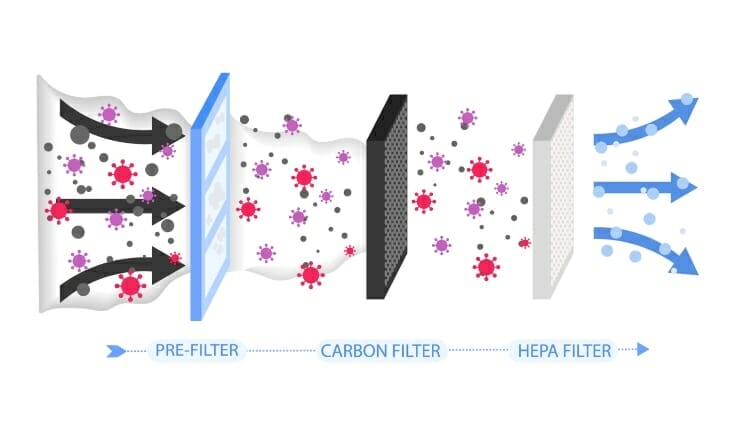What is a hepa Filter?

HEPA (High-Efficiency Particulate Air) filters are specialized Air Filters designed to trap a minimum of 99.97% of particles that are 0.3 microns in diameter. This high level of efficiency is crucial in environments requiring stringent air quality standards, such as hospitals, laboratories, and Clean Rooms.
How hepa filters Work
The filtration mechanism of hepa filters involves three processes: interception, impaction, and diFFUsion. These processes allow HEPA filters to capture microscopic particles effectively. For instance, particles larger than 0.3 microns are trapped through impaction, while smaller particles are captured via diffusion. This results in a significantly cleaner air output, making HEPA filters essential in various applications.
Standards and Classifications
HEPA filters must meet specific international standards to be classified as such. According to the U.S. Department of Energy (DOE), a true hepa filter must meet the efficiency requirement of 99.97% for particles that are 0.3 microns in size. In Europe, HEPA filters are classified according to EN 1822 standards, with classifications ranging from H10 to H14, where H14 filters achieve over 99.995% efficiency for the same particle size.

Applications of HEPA Filters
HEPA filters are widely used across various sectors. In healthcare, they help prevent the spread of airborne pathogens, while in residential settings, they improve indoor air quality.
Maintenance and Lifespan
The lifespan of a HEPA filter typically ranges from 6 months to 3 years, depending on usage conditions and the environment.
In conclusion, HEPA filters are essential components in various applications due to their ability to effectively capture microscopic particles. Their compliance with international standards ensures a high level of air quality, making them indispensable in settings where cleanliness is paramount.

Relevant Standards
U.S. Department of Energy (DOE): True HEPA filters must capture 99.97% of 0.3-micron particles.
EN 1822: European standard for HEPA filters, with classifications H10 to H14.
ASHRAE Standard 52.2: Standard for testing air filter performance.
ISO 29463: International standard for particulate air filters.
How do I know if a filter is HEPA?

1. Understanding HEPA Filters
HEPA stands for High-Efficiency Particulate Air. To qualify as a HEPA filter, it must capture at least 99.97% of particles that are 0.3 microns in size. Look for certification labels or documentation from the manufacturer that confirms compliance with the HEPA standard, which ensures the filter's efficiency and reliability.
2. Identifying HEPA Filters
Check for the HEPA certification on the product packaging or specifications. Genuine HEPA filters will often display this information prominently.
3. Key Features of HEPA Filters
HEPA filters are designed to trap a wide range of airborne particles, including dust, pollen, pet dander, and smoke. They are commonly used in air purifiers, vacuum cleaners, and HVAC systems. When selecting a HEPA filter, ensure it meets the EN 1822 standard, which is recognized internationally. This standard guarantees that the filter has been tested for its efficiency and performance, providing assurance of its quality and effectiveness in improving indoor air quality.
When should you use a HEPA filter?

Optimal Usage Scenarios
HEPA filters are particularly beneficial in environments where air quality is a concern, such as homes with pets, allergy sufferers, or during wildfire season. They help reduce allergens and pollutants, creating a healthier living space.
General Recommendations
Consider using HEPA filters in air purifiers and HVAC systems for optimal air quality.
International Standards
HEPA filters must comply with international standards such as EN 1822 in Europe and ASHRAE 52.2 in the United States, ensuring they meet rigorous performance criteria.
What is the difference between HEPA filter and air filter?

1. HEPA vs. Standard Air Filters:HEPA filters are a specific type of air filter that meets strict efficiency standards, capturing 99.97% of particles at 0.3 microns. In contrast, standard air filters may not have the same level of filtration efficiency and can allow smaller particles to pass through.
2. Filtration Efficiency:HEPA filters are more effective at trapping fine particles compared to standard filters.
3. Applications and Benefits:HEPA filters are ideal for environments requiring high air quality, such as hospitals and clean rooms. They significantly reduce allergens and pollutants, making them essential for individuals with respiratory issues. Standard air filters, while useful for general dust and debris, do not provide the same level of protection against smaller particles.
4. Cost Considerations:While HEPA filters may be more expensive than standard filters, their benefits in improving air quality and health justify the investment.
Which is better, UV or HEPA filter?

Both UV and HEPA filters serve different purposes in air purification. HEPA filters excel at capturing particulate matter, while UV filters are effective at neutralizing bacteria and viruses. For comprehensive air purification, a combination of both technologies is often recommended. This dual approach ensures that both airborne particles and pathogens are effectively removed, providing a healthier indoor environment. Ultimately, the choice between UV and HEPA filters depends on specific needs, such as allergy management or pathogen control.
 +86 18186671616
+86 18186671616 Jason@cleanroomequips.com
Jason@cleanroomequips.com
 MENU
MENU


